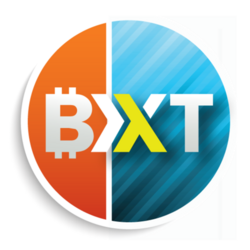Bitcoin XT
Topic: Software
 From HandWiki - Reading time: 5 min
From HandWiki - Reading time: 5 min
 | |
| Initial release | August 15, 2015 |
|---|---|
| Final release | Release I
/ 22 April 2018 |
| Repository | github |
| Type | Cryptocurrency |
| License | MIT License |
| Website | bitcoinxt |
Bitcoin XT was[1] a fork of Bitcoin Core, the reference client for the bitcoin network. In mid-2015, the concept achieved significant attention within the bitcoin community amid a contentious debate among core developers over increasing the block size cap.[2] The current reference implementation for bitcoin contains a computational bottleneck.[3]
This averages to a daily maximum of around 300,000 transactions.[4]
It was proposed that the block size increase to eight megabytes, and from then onwards to automatically increase it exponentially, doubling every two years. The proposal did not gain the necessary support to go into effect on the Bitcoin network by early 2016, the earliest possible switchover date. Its use has been in steady decline from March 2016 onwards.
As of August 2017, Bitcoin XT is a Bitcoin Cash client by default.[5]
History
On June 10, 2014 Mike Hearn published a Bitcoin Improvement Proposal (BIP 64), calling for the addition of "a small P2P protocol extension that performs UTXO lookups given a set of outpoints."[6] On December 27, 2014 Hearn released version 0.10 of the client, with the BIP 64 changes.[7]
On June 22, 2015, Gavin Andresen published BIP 101 calling for an increase in the maximum block size. The changes would activate a fork allowing eight MB blocks (doubling in size every two years) once 75% of a stretch of 1,000 mined blocks is achieved after the beginning of 2016.[8] The new maximum transaction rate under XT would have been 24 transactions per second.[9]
On August 6, 2015 Andresen's BIP101 proposal was merged into the XT codebase.[10][11] Bip 101 was reverted[12] and the 2-MB block size bump of Bitcoin Classic was applied instead.
Reception
The August 2015 release of XT received widespread media coverage. The Guardian wrote that "bitcoin is facing civil war".[2]
Wired wrote that "Bitcoin XT exposes the extremely social — extremely democratic — underpinnings of the open source idea, an approach that makes open source so much more powerful than technology controlled by any one person or organization."[13] Developer Adam Back was critical of the 75% activation threshold being too low and that some of the changes were insecure.[14]
Bitcoin Cash support
On August 25, 2017, Bitcoin XT published Release G, which was a Bitcoin Cash client by default.[5] Subsequently, Release H was published, which supported the November 2017 Bitcoin Cash protocol upgrade, followed by Release I, which supported the May 2018 Bitcoin Cash protocol upgrade.
See also
References
- ↑ https://github.com/bitcoinxt/bitcoinxt/releases/tag/v0.11K, https://honest.cash/v2/dgenr8/xt-wont-follow-may-19-bch-fork-4313
- ↑ 2.0 2.1 Alex Hern (2015-08-17). "Bitcoin's forked: chief scientist launches alternative proposal for the currency". the Guardian. https://www.theguardian.com/technology/2015/aug/17/bitcoin-xt-alternative-cryptocurrency-chief-scientist. Retrieved 20 August 2015.
- ↑ "Inside the Fight Over Bitcoin’s Future". The New Yorker (Conde Naste). 25 August 2015. http://www.newyorker.com/business/currency/inside-the-fight-over-bitcoins-future. Retrieved 7 January 2017.
- ↑ Ryan Whitwam (25 August 2015). "Disagreement over Bitcoin’s future threatens to fork the currency". Extreme Tech (Ziff Davis, LLC). https://www.extremetech.com/computing/212919-disagreement-over-bitcoins-future-threatens-to-fork-the-currency. Retrieved 7 January 2017.
- ↑ 5.0 5.1 "Bitcoin XT Releases". https://github.com/bitcoinxt/bitcoinxt/releases. Retrieved 17 June 2018.
- ↑ "bips/bip-0064.mediawiki at master · bitcoin/bips · GitHub". GitHub. https://github.com/bitcoin/bips/blob/master/bip-0064.mediawiki.
- ↑ "bitcoinxt/bitcoinxt". https://github.com/bitcoinxt/bitcoinxt/releases/tag/v0.10.
- ↑ "bips/bip-0101.mediawiki at master · bitcoin/bips · GitHub". GitHub. https://github.com/bitcoin/bips/blob/master/bip-0101.mediawiki.
- ↑ Tim Hornyak (21 August 2015). "Bitcoin XT debate overshadowing growth opportunities". PC World (IDG). http://www.pcworld.com/article/2974339/bitcoin-xt-debate-overshadowing-growth-opportunities.html. Retrieved 7 January 2017.
- ↑ "Implement hard fork to allow bigger blocks · bitcoinxt/bitcoinxt@946e3ba". https://github.com/bitcoinxt/bitcoinxt/commit/946e3ba8c7806a66c2b834d3817ff0c986c0811b.
- ↑ "bitcoinxt/bitcoinxt". https://github.com/bitcoinxt/bitcoinxt/releases/tag/v0.11A.
- ↑ "2MB block size bump by dgenr8 · Pull Request #117 · bitcoinxt/bitcoinxt". https://github.com/bitcoinxt/bitcoinxt/pull/117.
- ↑ Cade Metz (19 August 2015). "The Bitcoin Schism Shows the Genius of Open Source". WIRED. https://www.wired.com/2015/08/bitcoin-schism-shows-genius-open-source/.
- ↑ Everett Rosenfeld (20 August 2015). "Bitcoin splits: Will it break, or be better than ever?". CNBC. https://www.cnbc.com/2015/08/20/bitcoin-splits-will-it-break-or-be-better-than-ever.html. Retrieved 5 January 2017.
External links
- Bitcoin XT on GitHub
 KSF
KSF